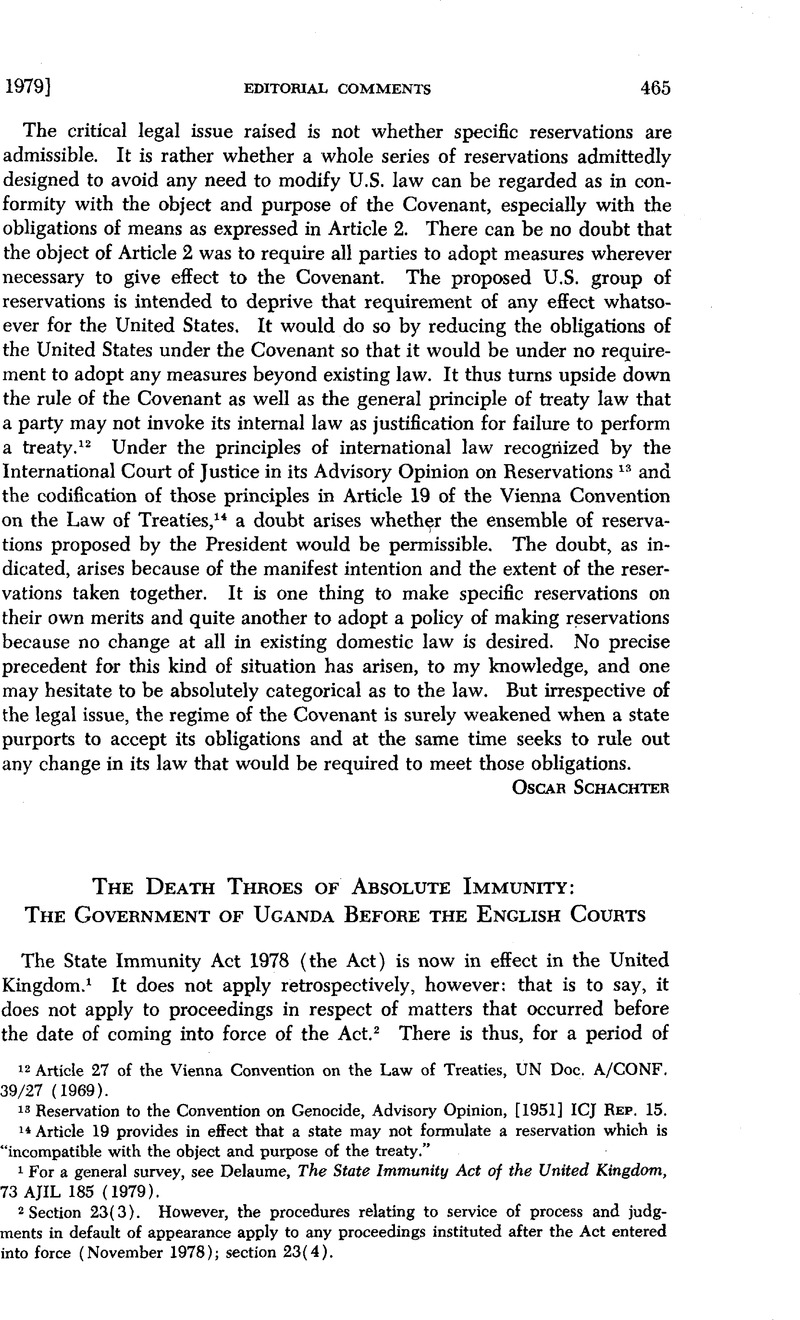Published online by Cambridge University Press: 27 February 2017

1 For a general survey, see Delaume, The State Immunity Act of the United Kingdom, 73 AJIL 185 (1979).
2 Section 23(3). However, the procedures relating to service of process and judgments in default of appearance apply to any proceedings instituted after the Act entered into force (November 1978); section 23( 4).
3 See Ugandan Properties and Businesses Section (Acquisition) Decree 1972 (Decree No. 32 of 1972); Ugandan Property and Businesses (Acquisition) Order 1972 (S.I. 1972 No. 189); and Properties and Businesses (Acquisition) Decree 1975 (Decree No. 11 of 1975).
4 The point may perhaps have been taken that some of the tea arriving in England had not yet been growing when Decree No. 32 was issued. No doubt the formulation of the claim was influenced by the possibility of securing a so-called Mareva injunction restraining the defendants from disposing of the tea warehoused in London. This application succeeded. The defendants now sought to set aside the writ.
5 E.g., Mavrommatis [1925] PCIJ ser. A, No. 5, at 51; Chorzów Factory case, [1928] PCIJ ser. A, No. 17, at 47 (dicta only).
6 The tribunal in the Texaco-Libya award cites the case of The Temple of Preah Vihear, [1962] ICJ REP. 6; and the Martini case, 25 AJIL 554 (1931).
7 I am here assuming that the compulsory acquisition was contrary to international law because of the total failure to pay compensation. It is not relevant in the present context to discuss whether the traditional standard of “adequate, prompt and effective compensation” properly represents contemporary international law. However, the fact that the Uganda Government had stated that compensation was to be paid could, of course, have led to argument as to whether it was premature to find that there was a breach of international law. My own view is that where there is not even a partial and long-term compensation, but rather no reasonable prospect of compensation at all, an international wrong has by now become crystallized.
8 [1953] 1 W.L.R. 246.
9 [1927] 3 K.B. 532.
10 [1956] Ch. 323.
11 [1977] 3 W.L.R. 778, appeal pending. See Higgins, Recent Developments in the Law of Sovereign Immunity in the United Kingdom, 71 AJIL 423, 431 (1977).
12 E.g., the congressional amendment to the Sabbatino case, 22 U.S.C. 2370(c)(2) (1970 and Supp. V, 1975); and Dunhill v. Republic of Cuba, 425 U.S. 682 (1975).
13 [1977] 2 W.L.R. 356 (C.A.), reprinted in 16 ILM 471 (1977). This was an appeal from a first instance judgment by Donaldson J., who had held the Central Bank of Nigeria immune from suit, as it was a department of the Federal Republic of Nigeria.
14 The Philippine Admiral ([1976] 2 W.L.R. 214, reprinted in 15 ILM 133 (1976)) marked the abandonment by the Privy Council of the absolute rule in respect of actions in rem. The Privy Council had indicated that it was open to the House of Lords to decide that the absolute rule also no longer applied to actions in personam, but thought it was “at the least unlikely that it would do so.” Id. at 233.
15 The Trendtex case, [1977] 2 W.L.R. 385, per Shaw L.J. Stephenson L.J., however, found that the Court of Appeal is bound by previous decisions to hold that absolute sovereign immunity is a rule of international law until the House of Lords or Parliament declares to the contrary.
16 Id. at 388.
17 Ibid.
18 Lord Denning conceded that he had “accepted without question” the doctrine of transformation in R. v. Secretary of State for the Home Department, ex parte Thakrar, [1974] 1 Q.B. 684, 701.
19 [1975] 1 W.L.R. 1485.
20 There was, of course, no question of his having to follow as a matter of precedent, even if he had chosen to follow Trendtex, the views of Lord Denning and Shaw L.J. on incorporation. These views were dicta.
21 Had either been (and assuming always that the incorporation theory is irrelevant and only the rules of precedent are to be considered—which seems to have been Donaldson J.'s position), then the Court of Appeal would not have been bound to follow such a previous decision. Young v. Bristol Aeroplane Co. Ltd., [1944] 1 K.B. 719, 729.
22 Trendtex had never reached the House of Lords, being settled out of court after the Court of Appeal stage. The judgment does not identify which firm decision in the House of Lords in favor of absolute immunity the parties had in mind, but one supposes it was The Cristina ([1938] A.C. 485).
23 In Trendtex Shaw L.J. had endeavored to render the earlier judgment in Thai- Europe compatible with what was now being decided, by suggesting that the difference between Lord Denning and Lawton and Scarman L.JJ. in Thai Europe had not gone to the ratio, and that there might have been a flaw in the reasoning of the latter. This editor prefers the view of Donaldson J. that Thai-Europe and Trendtex are indeed incompatible.
24 See note 14 supra.
25 To be followed almost immediately in that court by 1” Congreso del Partido, which is likely to elaborate further the distinctions between jure imperii and jure gestonis. On June 4, on the eve of the Court of Appeal hearing, Uganda Holdings was settled; plaintiffs dropped their action against the new Government of Uganda.